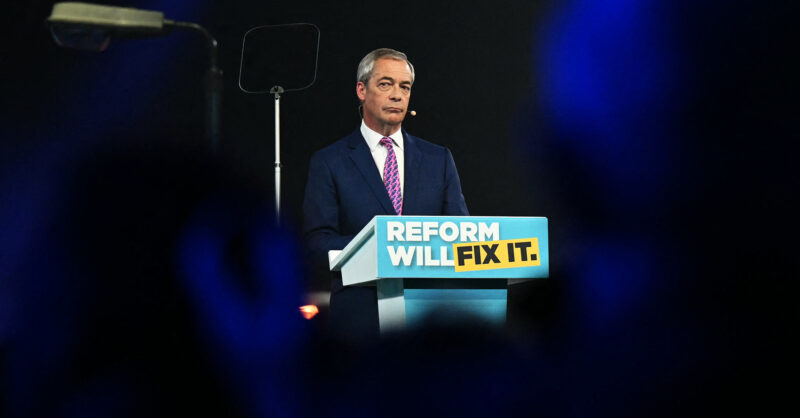
Reform UK Leader Nigel Farage speaks to attendees during the political party Reform UK's Local Election Campaign Launch, in Birmingham, central England, on March 28, 2025. (Photo by Oli SCARFF / AFP) (Photo by OLI SCARFF/AFP via Getty Images)
Nigel Farage, a long-standing figure in British politics, is again in the limelight with his party, Reform UK, amid internal strife and public scrutiny. Recently described at a rally in Birmingham as an insurgent political force on the edge of a metaphorical civil war, Reform UK faces significant challenges and opportunities as it seeks to position itself in a rapidly changing political landscape.
Backdrop to Birmingham Rally and Internal Tensions
The Birmingham Utilita Arena recently hosted what was promoted as a major political rally for Reform UK, aligning with their local-election campaign launch. However, the event’s reality reflected a party grappling with internal disagreements and external pressures. As the rally approached its start, significant protests outside revealed tensions between Reform’s anti-immigration stance and Birmingham’s diverse cultural fabric.
A striking element was a campaign orchestrated by Led by Donkeys, projecting an image of Nigel Farage with Vladimir Putin, implicating Farage’s contentious stance on the Ukraine war. Such protests, though not unexpected, seemed to mask deeper issues within the party. Amidst these demonstrations, claims of packed arenas clashed with half-full seats – an emblematic representation of the party’s overstated backing.
Leadership Challenges and Internal Dissent
Nigel Farage’s leadership style often characterized by his bold rhetoric and contentious policies, is now under increased scrutiny. The rally displayed evidence of internal discord, manifesting in references to MP Rupert Lowe’s controversial ousting over allegations of harassment. Supporters vocal in their dissent found themselves silenced by party officials keen to present a united front. Attendees showcased a mix of loyalty and disenchantment, illustrating Farage’s challenges in maintaining coherence within the party ranks.
Lowe’s departure and the subsequent fallout highlight a broader issue within Reform UK that extends beyond singular personalities. As Reform positions itself as an alternative to traditional parties, maintaining unity becomes crucial amidst accusations that threaten to derail its populist credentials.
Reform UK’s Political Messaging
The rally’s thematic presentation anchored Reform UK’s narrative around a « broken Britain » motif, employing visual metaphors of mundane British life satires. From the symbolic barber shops to overflowing bins, the imagery sought to connect with public frustrations regarding government management. Nevertheless, while critiquing existing governance, tangible solutions from Reform remain nebulous, with skepticism from the audience indicating a demand for substantive policy shifts beyond rhetoric.
Farage’s declarations, although steeped in emotive language, underscored commitments to leave the European Convention on Human Rights and enact decisive immigration policies. Despite appealing to a disenfranchised audience, the formulations often mirrored the populist tone critiqued by Reform’s detractors.
Future Prospects and Potential Obstacles
As May’s local elections loom, Reform UK’s aspirations are tempered by the realities of political engagement and execution. Success would mean assuming responsibility for local governance, a position requiring concrete policy application beyond campaign slogans. The prospect of navigating local government intricacies and addressing funding constraints will test Reform’s ability to translate campaign promises into substantial impact.
Reform’s performance in upcoming elections will be pivotal in determining its viability beyond the rhetoric of anti-establishment narratives. As Farage described the local elections as a significant « hurdle, » achieving resilience within its structure and clarity in its purposes are essential to escape the pitfalls of appearing as another establishment entity. The promise of reform, therefore, hinges on demonstrating genuine capacity for transformation – a test of its potential to transcend insurgent roots and effectuate meaningful change.




